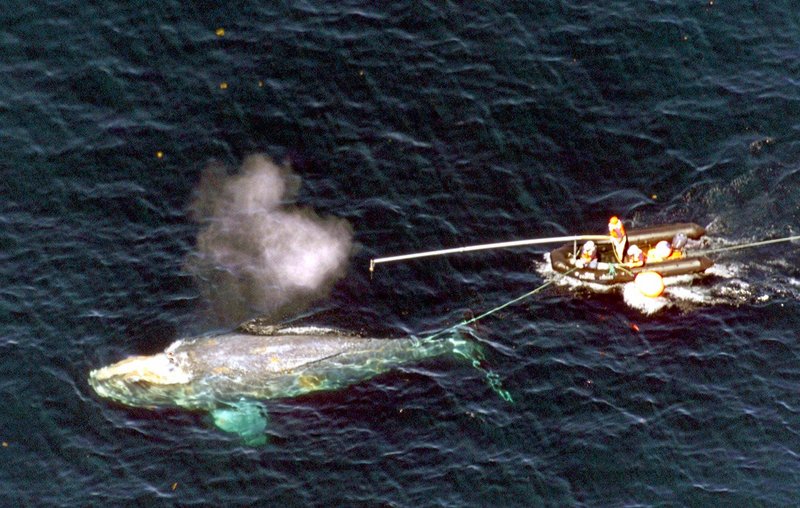A new federal rule proposal that seeks to support the state’s fisheries while also protecting whales, dolphins and other marine mammals from getting hurt or killed in trawl lines and other fishing gear will be the subject of public hearings in Maine next month.
The proposal was released Friday by the National Oceanic and Atmospheric Administration’s National Marine Fisheries Service, known as NOAA Fisheries. It includes gear changes, area closures, disentanglement measures, research and outreach efforts. It would affect fisheries along the Atlantic coast from Maine to Florida.
In Maine, the proposal would primarily affect lobster harvesters and gill-net fishermen by altering what and how gear is used and establishing closures of two selected fishing areas, federal officials said.
Final approval will not take place until after a public comment period. In Maine, that will be in August. Proposed rules could – and likely would – be refined after federal officials hear from various stakeholder groups, such as lobster harvesters, gill-net and line fishermen, scientists, marine researchers and conservationists.
“We’re reviewing (the recommendations) very carefully,” said Patrice McCarron, executive director of the Maine Lobstermen’s Association. “There’s a lot to them,” she said, “and the devil is always in the details. We will really go through them with a very fine-toothed comb.”
NOAA Fisheries has been working since the mid-1990s to regulate fishing activities to enhance the survival of marine mammals. Since then, marine researchers and federal officials have learned more about how the whales become trapped in lines and nets and several times have revised the original Atlantic Large Whale Take Reduction Plan, which addresses problematic encounters between marine mammals and fishermen and boats.
Each revision has been hotly debated among groups with sometimes competing interests. The most recent set of revisions started in 2009, said Kate Swails, NOAA Fisheries’ marine mammal analyst and coordinator of the Atlantic Large Whale Take Reduction Team, which produced the suggested policies with input from fishermen, researchers and marine mammal specialists and state governments.
“It’s been a long, long process,” said McCarron, whose group represents about 1,200 lobstermen statewide. “There’s a lot of frustration and there’s a lot of fatigue.”
Lobstermen and other fishermen feel worn down by the fight to keep the fisheries profitable, healthy, sustainable and safe.
“But as tedious as it is, we will be encouraging fishermen to read and think about them,” McCarron said of the proposed rules, adding that lobstermen will be urged to attend the meetings and let their feelings be known.
Swails said it will take the cooperation of many different interest groups to come up with an acceptable set of revised rules.
“It’s an intricate problem,” she said.
Under the Marine Mammal Protection Act, the number of deaths or serious injuries resulting from commercial fishing activities must not affect a species’ ability to reach or sustain its optimum sustainable population, NOAA Fisheries officials said. Currently, the number of serious injuries and deaths for right whales is nearly double sustainable limits and more than double those limits for humpbacks.
NOAA is attempting to lower marine mammal entanglements with a variety of techniques, such as reducing the number of vertical lines in the water column by increasing the minimum number of traps per trawl; clearer marking of gear and other modifications to equipment; and fishing closures during certain periods and in areas when the greatest number of whales and marine mammals are active.
NOAA also recommends gear-setting requirements to make it easier for snared whales to free themselves.
The proposed rules are designed to more closely accommodate both the needs of large marine mammals and the fishing industry, Swails said.
“I try to talk about the reality of fishing in Maine,” McCarron said, adding that many of the federal recommendations are good ideas but may need to be adapted to real-life conditions on the water. “We need to educate people about the cost of fishing, about the safety of fishing,” she said.
Several seasonal closure alternatives are proposed for all trap and pot fisheries. Maine lobstermen would be affected by closures of Jordan’s Basin off Acadia National Park from Nov. 1 to Jan. 31 and Jeffreys Ledge, a 33-mile-long, somewhat shallow area stretching from the coast of Rockport, Mass., to southeast of Cape Elizabeth, from Oct. 1 to Jan. 31.
Send questions/comments to the editors.


